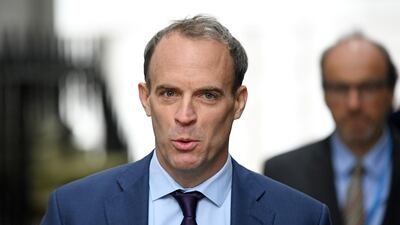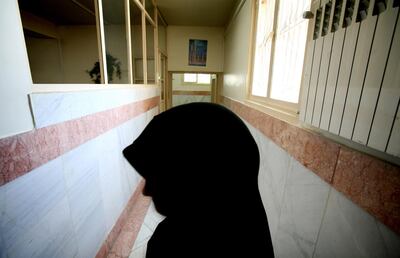UK Foreign Secretary Dominic Raab has hit out at Iran over its imprisonment of dual citizens such as Nazanin Zaghari-Ratcliffe, calling their detention arbitrary and unacceptable.
Mr Raab told a foreign affairs committee that the UK was using every diplomatic channel available to secure the release of British dual citizens held in Iran.
He said he was in contact with his Iranian counterpart Javad Zarif throughout the summer and spoke to Ms Zaghari-Ratcliffe, who is under house arrest in Tehran.
“Obviously, we’re dealing with a regime which is incredibly intransigent on these issues,” Mr Raab said.
“We’re mobilising as much of diplomatic muscle as we can to try and secure their release.
"The detention of Nazanin and all the other dual nationals is arbitrary, unacceptable, and they should be released, returned to their families back in the United Kingdom as soon as possible."

A British-Iranian citizen, Ms Zaghari-Ratcliffe has been detained in Iran since April 2016. Tehran claimed she was plotting to topple the Iranian government and sentenced her to five years in prison.
Ms Zaghari-Ratcliffe, who worked for the Thomson Reuters Foundation – the media organisation’s philanthropic arm – denies the charges. She was released temporarily from Tehran’s notorious Evin Prison on March 17 because of the coronavirus crisis.
This month, Tehran postponed a new trial Ms Zaghari-Ratcliffe was facing for allegedly spreading propaganda against the regime.
Her husband Richard Ratcliffe said it was increasingly clear she was being held hostage against a long-standing UK debt to Iran.
Mr Raab said Britain was working with France and Germany on the issue of dual citizens detained in Iran.
“The position of the plight of our dual nationals is a good example of leverage in UK diplomacy not just bilaterally, but with our partners and our European partners,” he said.
In September, Britain, France and Germany summoned Iranian ambassadors in a co-ordinated diplomatic effort to protest against Iran’s detention of dual citizens.
On October 3, Iran temporarily released French-Iranian academic Fariba Adelkhah, according to her lawyer.
Ms Adelkhah, 61, who was arrested in 2019, was sentenced to six years in prison on national security charges in May and is being held at Evin.
Britain, France and Germany have made it clear they will continue to support the 2015 nuclear deal with Iran, in which international sanctions were lifted in exchange for concessions on the country’s nuclear programme, but maintain a hard line on the issue of detaining dual citizens.
The UK has come under pressure from the US to back Washington’s resumption of economic sanctions against Tehran. Washington withdrew from the nuclear deal, known as the Joint Comprehensive Plan of Action, in 2018.
Despite differing approaches on either side of the Atlantic, Mr Raab said pressure must be maintained on Iran.
“I do think it's important that we do not, by quite rightly debating different possible approaches, let Tehran off the hook for its conduct, and its systematic flouting of international law,” he said.


